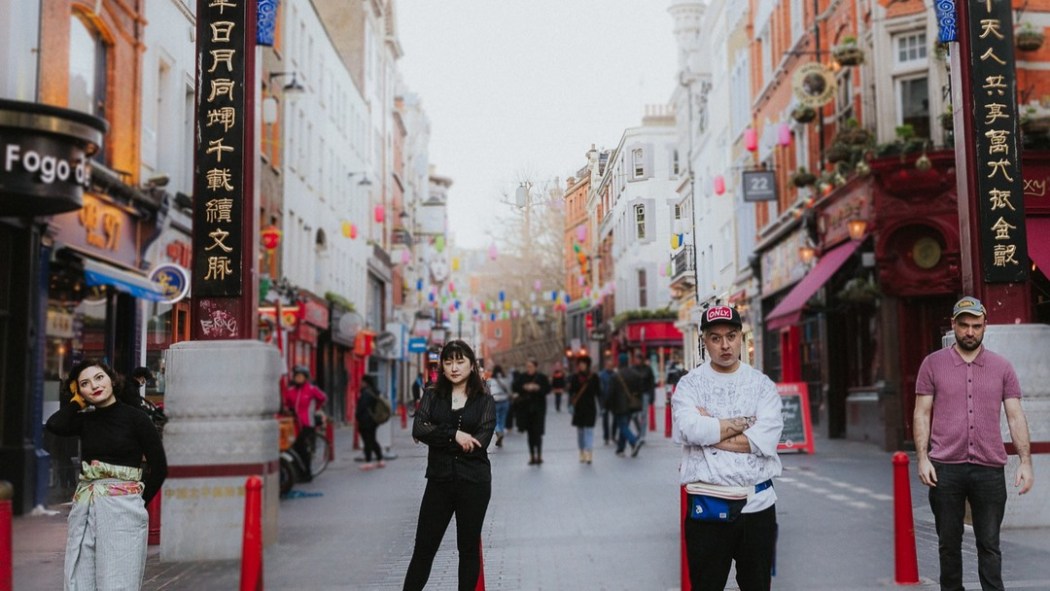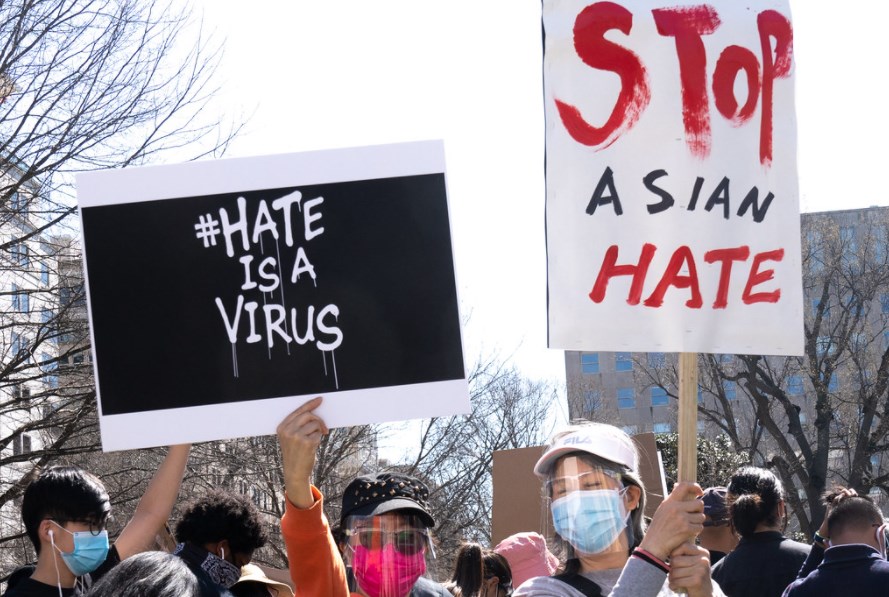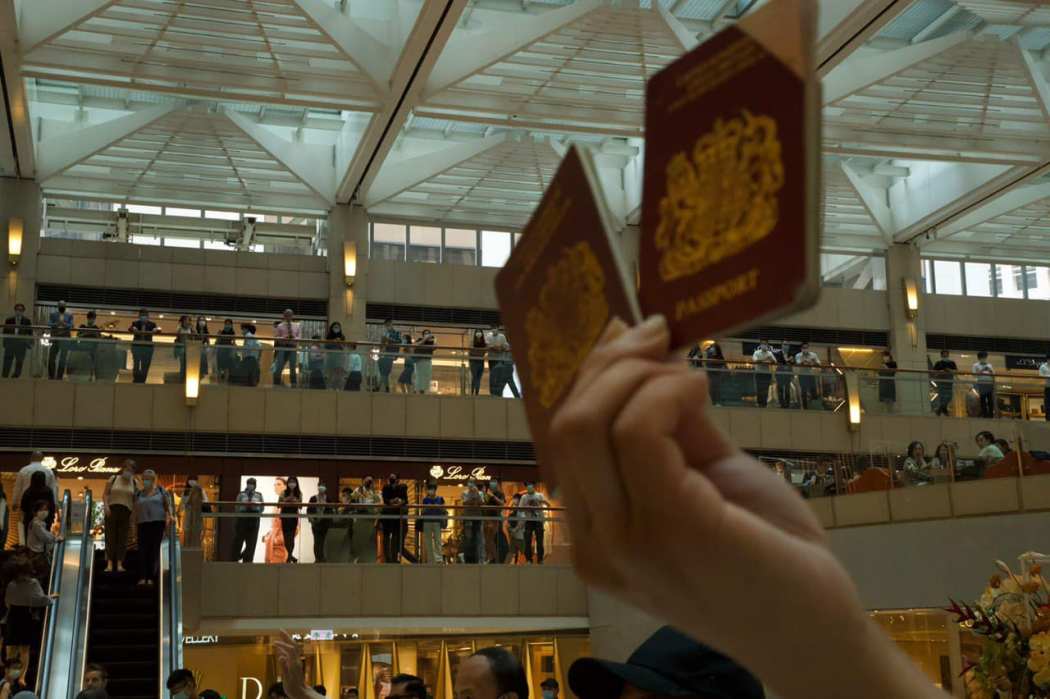The distinctive sound of bouncing ping-pong balls is the first indication that you’re approaching the headquarters of Hackney Chinese Community Services (HCCS) in east London, a charity founded by Chinese residents in 1985 to support local East Asian families.
Tuesday is table tennis day and almost everyone I meet there has a disturbing personal experience to tell of racist abuse suffered in Britain.

“Covid-19 and Brexit has made racists more bold – this xenophobic sentiment has empowered them,” says Jabez Lam, who works at the HCCS centre and has been combating anti-Asian hate crime in London for more than four decades.
Many Hong Kong British, including recent arrivals under the BNO visa scheme, must endure casual racist abuse on the streets of Britain and now they also face a second source of hatred – those Chinese organisations in the UK which are loyal to Beijing and regard BNO Hongkongers as the enemy.
One member of the HCCS recently told a BBC documentary how she was spat at by a white man as her train stopped at Camden station, in north London.
A British Vietnamese-Chinese, working as an outreach worker at the HCCS, recalls how she was confronted by a white youth who shouted “Corona” at her while she was visiting the dustbins just outside her London home.

“I was quite stunned – these incidents always bring about a feeling of shame, disappointment and fear,” says Vicky Sung, who adds that her mother’s salon business in east London has been persistently attacked by racist thugs.
“For British Chinese, you expect racism – hate is not new,” she says. “People coming to UK should know it can happen anytime and anywhere.”
Lam has just finished a virtual meeting with the Metropolitan Police Service’s Covid-19 – Chinese and East Asian Forum, set up in March 2020 to consult the East and South East Asian (ESEA) community following a sharp spike in racist hate crime.
UK hate crime
Hackney is one of the most multi-cultural boroughs of one of the most cosmopolitan cities in the world. The local museum boasts Hackney’s proud heritage as a tolerant refuge for migrants and dissidents, from Indian Lascars in the 18th century, to people migrating from the Caribbean after the Second World War, and South Asians fleeing Uganda in the 1970s. Yet there is no shortage of racist hate crime on its busy streets.

According to the London Assembly’s race hate crime dashboard, the 12-month rolling annual average of race hate crimes in Hackney is 1,013 and the problem is London-wide and nationwide. After a sharp spike in race hate crime in June 2020, the numbers of offences in London increased sharply again, to 1,827 in the month of April 2021.
The combination of Brexit, Covid-19 and growing public antipathy towards the Chinese state means much of this is directed at those from the ESEA community in London and elsewhere in the UK. It is making life increasingly intolerable for them.
“These are just everyday minor experiences,” says Lam as he points to the more severe cases, adding that most do not report the incidents of racist abuse and just “suffer in silence.”
According to one Metropolitan Police report there were 457 reported race hate crimes against what they classify as Chinese or Oriental ethnic types in London during the first six months of 2020.

In February that year, Jonathan Mok, aged 23, from Singapore suffered a fracture to his nose and cheekbone after an attack by a 16-year-old youth in London’s Oxford Street. The same month, university lecturer and Chinese national Peng Wang was viciously assaulted by four men in the city of Southampton.
“Anti-east Asian racism is a daily occurrence and it’s also a case of mistaken identity,” says Lam, highlighting the crass ignorance behind the abuse. While inexcusable and misplaced hatred triggered by the origins of the Covid-19 pandemic might be directed at Chinese nationals, the victims are anyone of even vaguely east-Asian appearance — including those with ethnic roots in Hong Kong, Singapore, Korea, Taiwan, Vietnam and Thailand.
Lam says younger East Asian British are less culturally reticent to protest than their forbears and more are speaking out to demand change.
One of those is musician Jonny Fox, founder member of the alt hip-hop band, Pho Queue Crew, formed to combat the rise in hate crimes against the British ESEA community since the start of the COVID-19 pandemic.

“It exploded post COVID — it was ridiculous,” he says.
Fox describes how in March this year, three of the band members were boarding a train at Plaistow in east London, when a drunk white man hurled racist abuse at them as he was alighting from the same train.

“Every day I turn on my phone on to some new hate crime in our community,” says Fox, who is planning a series of Stop Asian Hate marches and events over the coming months. The first was scheduled for Soho Square for 23 May but had to be postponed.
Hongkongers targeted
The dangers faced by Hongkongers and other east Asian people in Britain are hard enough to tolerate but Lam points to a second source of hostility and hate crime.
Many long-established Chinese community organisations in the UK offering anti-racism and other types of support, are loyal to the Chinese Communist Party and are highly critical of the pro-democracy movement in Hong Kong. Full-page advertisements have appeared in UK editions of Chinese newspapers in recent months, with some 200 Chinese organisations in the UK professing their support for the crackdown in Hong Kong and the controversial national security law.

Lam says these groups are hostile to newly arrived BNO Hongkongers and their supporters and provides alarming video evidence to back up his claims.
This video footage appears to show one well-established Chinese community support group called The Monitoring Group protesting outside a Denise Ho concert in London in October 2019. They appear to be photographing, abusing and threatening attendees and accusing them of being “cockroaches” – a derogatory term for protesters in Hong Kong.
Another video from November 2019 appears to show members of the same group attacking Lam, his partner and daughter after a “Stand with Kong Kong” demonstration in Soho, near London’s Chinatown.
When these allegations and video clips were presented to The Monitoring Group by HKFP, they did not deny the allegations.
“There is a significant context to the allegations (as their veracity) made by Mr Lam and the resulting investigations,” said co-director Suresh Grover in an emailed response.

There are many unsubstantiated reports of messages on WhatsApp, warning established Chinese businesses in London’s Chinatown not to employ, or deal with, recently arrived Hongkongers.
One Hong Kong woman who arrived in Manchester last year under the BNO visa scheme reported a hostile reaction from established Hong Kong organisations in that city and negative rhetoric on social media.
“Via Facebook, I have come into contact with a lot of (established) immigrants from Hong Kong saying that they were not fond of the new-coming Hong Kong immigrants,” she says.
The London Chinatown Chinese Association (LCCA) enjoys sponsorship from a number of prestigious mainland Chinese organisations including the Beijing city government and the Bank of China. It has also been accused of being hostile to new Hong Kong arrivals. The association made no response to questions from HKFP.

Lam, speaking in a private capacity and not on behalf of HCCS, says he fears that many Chinese organisations in the UK are hostile to those they were set up to support because they have been bought off, or influenced, by the Chinese Communist Party (CCP). This is part of a wider programme of political infiltration and control of the Chinese community in the UK. He says the CCP has “weaponised” the issue of anti-east Asian racism and made it part of an agenda for Chinese chauvinism. Beijing’s preferred narrative is that anti-ESEA racism is part of a media-driven conspiracy directed against China, the victim.
“The hostile environment created by the established Chinese organisations makes Hong Kong people worried about approaching established Chinese organisations, for fear that their personal details may get passed on to the Chinese embassy or the CCP,” says Lam. Though there is no evidence of this, the fear of family members in Hong Kong being exposed to potential risk is a powerful one and it’s not just Lam who is concerned.

“Racism and pro-CCP groups are equally both the potential risk to new BNO arrivals,” says Simon Cheng, a democracy activist and founder of Hong Kongers in Britain. He has also suffered racist abuse on the streets of London, been repeatedly followed and received copious hateful comments on social media.
“Yes, we are aware of such hostility towards newly arrived Hongkongers,” says Fred Wong of the Hong Kong Assistance and Resettlement Community.
“I have heard discussions amongst pro-China Hongkongers (typically from groups like LCCA and other Chinatown groups) about how the newcomers will ruin their ‘reputation which has taken them decades to build up,’ who will be leeches to the UK society and that they will destroy public property in the UK as those who are coming over are pro-democratic protesters,” adds Wong.
Newly arrived families from Hong Kong who are offered a warm welcome and preferential immigration status by the UK government are not only exposed to the risk of malicious racist abuse but also face hatred from some of those organisations they might have turned to for help.
“I think BNO-ers are probably more worried about pro-NSL (national security law) Chinese organisations (in the UK) than racism,” says Lam.
Correction 17.35: Vicky Sung is a British Vietnamese-Chinese, not a British-Hongkonger as an early version of this article stated. Also, a previous version of this article refered to the “Min Quan- The Monitoring Group.” The group is, in fact, called “The Monitoring Group.”
Support HKFP | Policies & Ethics | Error/typo? | Contact Us | Newsletter | Transparency & Annual Report | Apps
Help safeguard press freedom & keep HKFP free for all readers by supporting our team
























